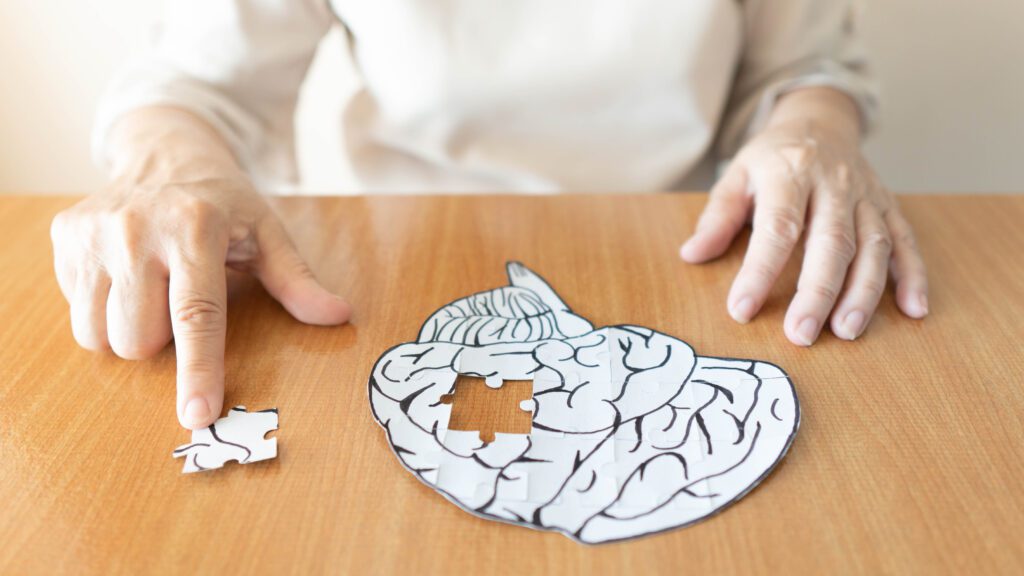There’s no doubt about it, dementia, an overarching term for illnesses that cause brain function to deteriorate, is on the rise.
According to a recent article in the New York Times, dementia, affects 6.5 million adults over 65 years old, and The Alzheimer Association projects that figure will nearly double by 2050. As a result, dementia, which most commonly manifests as Alzheimer’s Disease, regularly ranks in consumer polls as one of the most feared diseases, and that anxiety looms particularly large when Alzheimer’s runs in your family.
On the upside, recent research suggests that by supporting your sex hormone levels with treatments like nutraceuticals or hormone replacement therapy may help to prevent Alzheimer’s, even if you’re genetically predisposed to it.
Alzheimer’s Disease and its Risk Factors
Alzheimer’s Disease is a progressive form of dementia that usually begins with mild memory loss. Over time, it can result in severe loss of memory, cognition, and language, and seriously affect an individual’s quality of life. There is currently no cure. Age, sex, and genetics are three of the biggest risk factors for Alzheimer’s Disease. Symptoms of the disease usually develop after age 60, and according to the CDC, “The number of people living with the disease doubles every 5 years beyond age 65.” As well, women are more likely to develop the disease and currently make up 65 percent of those who currently have dementia, according to the Alzheimer’s Society.
Genetics also play a massive role in an individual’s risk for Alzheimer’s. According to Harvard Health, if you have a close relative who has been diagnosed with Alzheimer’s, your risk for the disease increases by about 30 percent.
That said, there is mounting scientific evidence to support that living a healthy lifestyle, including eating a good diet, getting exercise, limiting alcohol, and abstaining from cigarettes can help prevent the disease, even if it’s in your family. Likewise, new research shows that maintaining balanced levels of progesterone, testosterone, and estrogen in the body can be an important preventative step.
Alzheimer’s Potential Link To Hormones
In the last decade, several eye-opening studies have shown a potential link between the sex hormones and the development of Alzheimer’s. For instance, while it’s not fully understood why women seem to develop Alzheimer’s more than men, recent studies suggest there may be a link between the disease and estrogen levels.
While both males and females generate estrogen, it predominantly serves as the primary sex hormone in females, and female bodies naturally produce higher levels of estrogen. During menopause, estrogen production diminishes in women, and science shows this may play a part in their increased risk of Alzheimer’s.
“Estrogen prevents dementia by augmenting Hippocampal and prefrontal cortex function, reducing neuroinflammation, preventing degradation of estrogen receptors, decreasing oxidative damage to the brain, and increasing cholinergic and serotonergic function,” explains a comprehensive review of the literature published in the National Library of Medicine.
Likewise, a variety of studies suggest progesterone, a hormone that supports menstruation, pregnancy, and other functions particularly, has an important role in the prevention of Alzheimer’s. One study in rats showed that administering both estrogen and progesterone “independently and interactively” reversed symptoms of Alzheimer’s Disease (AD), and that “optimized hormone therapy may be useful in reducing the risk of AD in postmenopausal women.”
Scientific literature finds that levels of testosterone (T), the male sex hormone, may also be at play when it comes to Alzheimer’s. According to a recent study from World J Men’s Health that looked at seventeen studies involving testosterone administration and Alzheimer’s Disease, testosterone replacement had “positive results” on cognitive impairment and the “majority of studies showed the T administration improved memory and cognition.”
As a result of these promising studies, Hormone Replacement Therapy has begun to get attention in the media for its potential to support neurological health and mitigate cognitive issues, particularly when therapies are begun in mid-life.
Maintaining Balance for Your Cognitive Health
Hormonal imbalance, or periods when the body has too much or too little of one or more of one or more hormone, may happen one or two times throughout an average person’s lifetime, including during puberty, pregnancy, or menopause.
Many hormonal imbalances resolve on their own, but some people experience chronic hormonal imbalances and irregularities that put their long-term health at risk. This is particularly true for women. According to research, 80 percent of women experience hormonal imbalance in their lifetime.
As this new evidence suggests, ongoing hormonal imbalance may mean more than just the insomnia, mood swings, weight gain, low libido, acne, hot flashes, and hair loss that stem from hormonal issues in the short-term. It could also be increasing your risk for cognitive decline and dementia in the long-term.
Therefore, maintaining balanced hormone levels throughout your life with lifestyle changes, nutraceuticals, and hormone replacement therapy, may be an essential way to prevent Alzheimer’s Disease and curb your health anxiety, particularly if the condition runs in your family.







